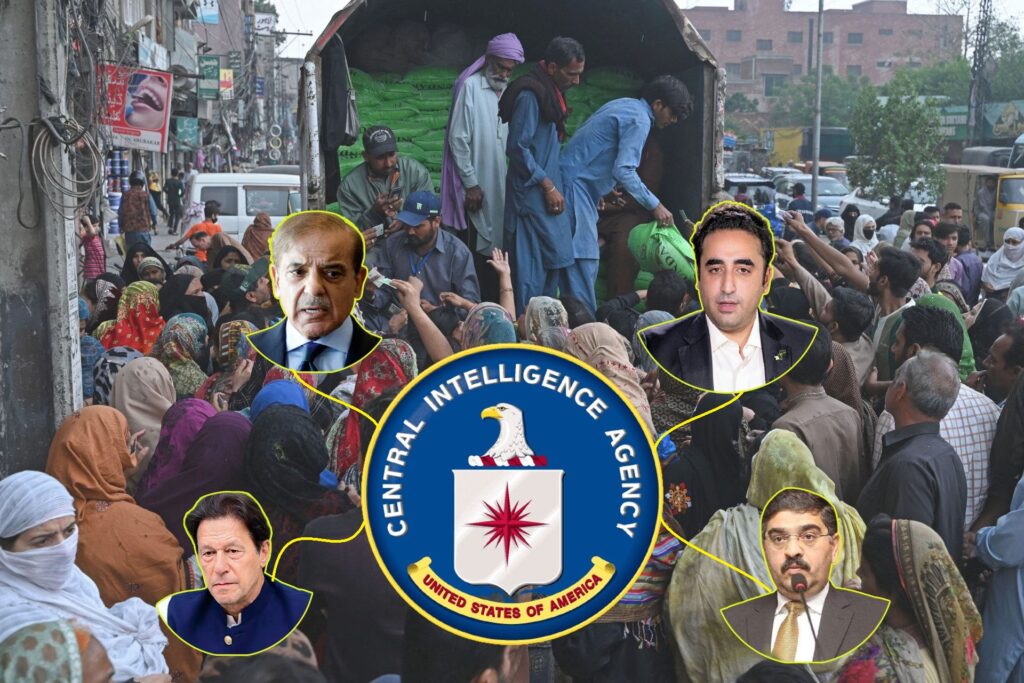
- The exit of Imran Khan, the rise of Bilawal Bhutto Zardari, and questions on external influences especially the CIA, add to the woes of Pakistan which is already plagued by economic turmoil.
- Pakistan grapples with the dual challenges of soaring inflation and the ominous threat of defaulting on its massive $77.5 billion external debt.
- The challenge of external interference is not unique to Pakistan. It only echoes a larger global narrative where economic vulnerabilities can lead to compromises that may impact long-term stability.
The political landscape of Pakistan finds itself at a crucial juncture, profoundly impacted by the removal and subsequent conviction of the once-prominent Prime Minister, Imran Khan, on charges of corruption. As the nation looks ahead to imminent elections, Khan’s allegations of foreign interference have ignited a passionate and complex debate, creating divisions within the public consciousness.
The unfolding saga began with a seismic shift in April 2022 when Imran Khan was ousted from his prime ministerial position through a no-confidence motion. This marked the closure of an era marked by a tapestry of both commendable achievements and controversial decisions. However, the shockwaves of his departure were soon met with the resounding clang of a conviction on corruption charges. This judicial action, aimed at upholding accountability and transparency, has been met with a dichotomous reception. While some hail this development as a monumental stride towards justice, others question the timing and motives behind the conviction, casting doubts on whether this is an exercise in accountability or a calculated silencing of a vocal political figure.
Imran Khan’s exit and aftermath
Embedded in this turmoil is the incendiary claim by Imran Khan that foreign forces, particularly the Biden Administration, orchestrated his downfall in collusion with his domestic rivals. This assertion has resonated deeply within a population shaped by decades of intricate relations with the United States. This historical backdrop of the complex interplay between Pakistan and the U.S. has cultivated a pervasive anti-American sentiment, making Khan’s allegations of external manipulation remarkably plausible in the eyes of many. The lack of substantial evidence notwithstanding, this sentiment reveals a latent distrust towards external actors and their potential influence on Pakistan’s political affairs.
The intrigue deepens with the spotlight on Imran Khan’s diplomatic moves, particularly his visit to Russia mere months before his ousting. Though a causal link between this diplomatic venture and his subsequent removal remains speculative, it raises pertinent questions about the subtle influences of international actors in moulding Pakistan’s political dynamics. This juxtaposition of external engagement and domestic consequences underscores the complexities inherent in contemporary geopolitics.
The aftermath of Khan’s exit saw a temporary shift in leadership, as Shabaz Sharif briefly assumed the mantle of prime minister before stepping aside. This vacuum paved the way for the appointment of Pakistan Senator Anwar-ul-Haq Kakar as the caretaker Prime Minister. Kakar’s proximity to the military establishment hints at the convergence of power centres and the military’s enduring influence on Pakistan’s political landscape. With elections looming on the horizon, the nation treads on uncertain terrain, where political transitions intersect with military hierarchies.
Interference by the US
Within this maelstrom of change, the rekindling of military ties between Pakistan and the United States carries significant implications. This re-engagement, accompanied by substantial financial commitments, serves as a stark reminder of the interplay between diplomatic relations, military cooperation, and economic imperatives. The confluence of these factors has led to speculative discussions about external agendas shaping the trajectory of Pakistan’s politics. Meanwhile, Bilawal Bhutto Zardari emerges as a compelling contender, his pedigree intertwining with political legacy and international recognition through his tenure as foreign minister. This confluence of political legacy and experience situates him as a formidable player amidst the turmoil.
In the grand tapestry of Pakistani politics, this recent transformation, symbolized by the exit of Imran Khan and the rise of Bilawal Bhutto, poses profound questions about external influences. The conjecture of foreign involvement, including the spectre of the CIA, in steering leadership changes to suit global agendas, adds another layer of complexity to an already intricate narrative. The dynamics at play serve as a vivid illustration of the interplay between domestic aspirations, global strategies, and the ever-present balancing act between sovereignty and external dynamics.
Economic Turmoil
The political upheaval is augmented by an economic crisis of staggering proportions. Pakistan grapples with the dual challenges of soaring inflation and the ominous threat of defaulting on its massive $77.5 billion external debt. This financial predicament underscores the delicate balance between economic stability and political sovereignty. The nation’s vulnerability to external pressures highlights the intricate balance between seeking international assistance and safeguarding autonomy. This challenge is not unique to Pakistan, echoing a larger global narrative where economic vulnerabilities can lead to compromises that may impact long-term stability.
Overall Impact on Pakistan
The conviction of a prominent leader carries profound implications beyond its immediate legal ramifications. It is a statement about the commitment to accountability and a reminder that no one, regardless of their position, is immune to the principles of justice. However, the scepticism surrounding the timing and motivations of this conviction underlines the persistent struggle between transparency and perceived political manoeuvres. This dynamic echoes far beyond Pakistan’s borders, resonating in societies grappling with similar power struggles.
The allegations of foreign interference, though still veiled in uncertainty, have illuminated the fragility of domestic politics in an era of complex international relations. Decades of diplomatic intricacies and shifting alliances have sown seeds of scepticism among the Pakistani populace. The resonance of these allegations serves as a barometer of the trust deficit that often characterizes the intersection of national interest and global dynamics.
(The author is a post-graduate student in International Relations at Kalinga University, Raipur. The opinions expressed are the author’s own)
Aayush Pal is a freelance writer on contemporary geopolitical developments. The views expressed in his work are entirely his own.
